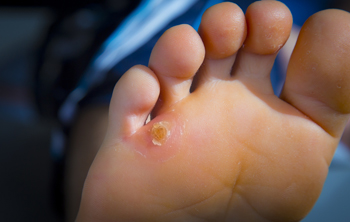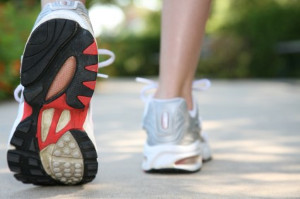November 2019
Plantar Warts Can Be Treated!
When to See a Podiatrist About Your Plantar Warts
 Plantar warts are caused by HPV and normally take the form of small growths that appear as lesions on the weight-bearing regions of one’s foot. While they are not seen as a serious health concern, it is important to treat these warts to maintain the health of your feet. Plantar warts most commonly affect children and teenagers, those with weak immune systems, and those who tend to walk barefoot on wart-causing surfaces like locker rooms. If you notice your lesion is bleeding, painful, or has changed color, it is recommended that you consult with a podiatrist. If the warts do not go away on their own or keep returning, and you are experiencing discomfort with normal activities, it is also advised you seek further help. Keeping your feet clean and dry, avoiding picking at your warts, and changing your shoes and socks daily are a few ways to help prevent plantar warts from appearing. If you would like to seek further information about plantar warts or would like the assistance of a professional to treat your plantar warts, we recommend you consult with a podiatrist.
Plantar warts are caused by HPV and normally take the form of small growths that appear as lesions on the weight-bearing regions of one’s foot. While they are not seen as a serious health concern, it is important to treat these warts to maintain the health of your feet. Plantar warts most commonly affect children and teenagers, those with weak immune systems, and those who tend to walk barefoot on wart-causing surfaces like locker rooms. If you notice your lesion is bleeding, painful, or has changed color, it is recommended that you consult with a podiatrist. If the warts do not go away on their own or keep returning, and you are experiencing discomfort with normal activities, it is also advised you seek further help. Keeping your feet clean and dry, avoiding picking at your warts, and changing your shoes and socks daily are a few ways to help prevent plantar warts from appearing. If you would like to seek further information about plantar warts or would like the assistance of a professional to treat your plantar warts, we recommend you consult with a podiatrist.
Plantar warts can be very uncomfortable. If you need your feet checked, contact Dr. John C. Lawlor from Florida. Our doctor will assist you with all of your foot and ankle needs.
About Plantar Warts
Plantar warts are the result of HPV, or human papillomavirus, getting into open wounds on the feet. They are mostly found on the heels or balls of the feet.
While plantar warts are generally harmless, those experiencing excessive pain or those suffering from diabetes or a compromised immune system require immediate medical care. Plantar warts are easily diagnosed, usually through scraping off a bit of rough skin or by getting a biopsy.
Symptoms
- Lesions on the bottom of your feet, usually rough and grainy
- Hard or thick callused spots
- Wart seeds, which are small clotted blood vessels that look like little black spots
- Pain, discomfort, or tenderness of your feet when walking or standing
Treatment
- Freezing
- Electric tool removal
- Laser Treatment
- Topical Creams (prescription only)
- Over-the-counter medications
To help prevent developing plantar warts, avoid walking barefoot over abrasive surfaces that can cause cuts or wounds for HPV to get into. Avoiding direct contact with other warts, as well as not picking or rubbing existing warts, can help prevent the further spread of plantar warts. However, if you think you have developed plantar warts, speak to your podiatrist. He or she can diagnose the warts on your feet and recommend the appropriate treatment options.
If you have any questions please feel free to contact one of our our offices located in Cape Coral and LaBelle, FL . We offer the newest diagnostic and treatment technologies for all your foot and ankle needs.
Read more about What Are Plantar Warts?How to Maintain Proper Foot Health When Pregnant
 Swollen feet is a common ailment many pregnant women are familiar with. It typically occurs as a result of pressure that is caused by the fetus, and warmer temperatures may also play a significant role. Many pregnant women who tend to stand for the majority of the day may experience pain, discomfort, and swelling in the feet and ankles. Moderate relief may be found by elevating the feet at the end of the day, wearing shoes that are comfortable, and by regularly drinking plenty of water. Research has indicated that performing gentle stretches may decrease a portion of the swelling. An effective stretch can consist of circulating the ankle several times, followed by changing directions. If you have questions about how to reduce swelling in your feet while being pregnant, please consult with a podiatrist.
Swollen feet is a common ailment many pregnant women are familiar with. It typically occurs as a result of pressure that is caused by the fetus, and warmer temperatures may also play a significant role. Many pregnant women who tend to stand for the majority of the day may experience pain, discomfort, and swelling in the feet and ankles. Moderate relief may be found by elevating the feet at the end of the day, wearing shoes that are comfortable, and by regularly drinking plenty of water. Research has indicated that performing gentle stretches may decrease a portion of the swelling. An effective stretch can consist of circulating the ankle several times, followed by changing directions. If you have questions about how to reduce swelling in your feet while being pregnant, please consult with a podiatrist.
Pregnant women with swollen feet can be treated with a variety of different methods that are readily available. For more information about other cures for swollen feet during pregnancy, consult with Dr. John C. Lawlor from Florida. Our doctor will attend to all of your foot and ankle needs.
What Foot Problems Can Arise During Pregnancy?
One problem that can occur is overpronation, which occurs when the arch of the foot flattens and tends to roll inward. This can cause pain and discomfort in your heels while you’re walking or even just standing up, trying to support your baby.
Another problem is edema, or swelling in the extremities. This often affects the feet during pregnancy but tends to occur in the later stages.
How Can I Keep My Feet Healthy During Pregnancy?
- Wearing orthotics can provide extra support for the feet and help distribute weight evenly
- Minimize the amount of time spent walking barefoot
- Wear shoes with good arch support
- Wear shoes that allow for good circulation to the feet
- Elevate feet if you experience swelling
- Massage your feet
- Get regular, light exercise, such as walking, to promote blood circulation to the feet
If you have any questions please feel free to contact one of our our offices located in Cape Coral and LaBelle, FL . We offer the newest diagnostic and treatment technologies for all your foot and ankle needs.
Read more about Pregnancy and Foot HealthCan Practicing Yoga Help to Prevent Running Injuries?
Research has indicated it is beneficial to perform specific stretching techniques that may be helpful in preventing running injuries. It is wise to choose running shoes that fit correctly, assuring the heel and toes feel comfortable. The joints, muscles, and tendons can remain flexible when yoga is routinely practiced, which may help to increase the enjoyment of running. Additionally, many runners practice strength training, this can keep the muscles strong which may add to endurance. Any tension that is present may be alleviated when a massage is performed, helping this to aid the body in feeling relaxed. If you are contemplating the sport of running, it is suggested that you speak to a podiatrist who can advise you on how to prevent running injuries.
Exercising your feet regularly with the proper foot wear is a great way to prevent injuries. If you have any concerns about your feet, contact Dr. John C. Lawlor of Florida. Our doctor will treat your foot and ankle needs.
How to Prevent Running Injuries
Many common running injuries are caused by overuse and overtraining. When the back of the kneecap starts wearing out and starts causing pain in your knee, this is commonly referred to as runner’s knee. Runner’s knee is a decrease in strength in your quadriceps and can occur if you’re not wearing properly fitted or supporting shoes. To prevent runner’s knee, focusing on hip strengthening is a good idea, as well as strengthening your quads to keep the kneecaps aligned.
What Are Some Causes of Running Injuries?
- One cause of a common running injury is called iliotibial band syndrome.
- Plantar fasciitis is also another common injury.
- Stress fractures can occur from overtraining, lack of calcium, or even your running style.
Best Ways to Prevent Running Injuries
- Wear footwear that fits properly and suits your running needs.
- Running shoes are the only protective gear that runners have to safeguard them from injury.
- Make a training schedule. Adding strengthening exercises as well as regular stretching can help keep you strong and limber and can lessen the possibility of injuries.
- Stretching keeps muscles limber; this will help you gain better flexibility.
If you have any questions please feel free to contact one of our our offices located in Cape Coral and LaBelle, FL . We offer the newest diagnostic and treatment technologies for all your foot and ankle needs.
Read more about How to Prevent Running InjuriesWearing Correct Shoes and Socks While Working
Many people spend the majority of their working day standing for extended periods of time. Research has indicated it is beneficial to perform specific types of stretches that can strengthen the muscles in the feet and legs. An effective calf stretch begins with standing against a wall, and extending one leg at a time in a backward direction, while standing flat on the floor. Additionally, it is helpful to wear shoes that fit correctly, and provide adequate support. Wearing socks that fit properly can be instrumental in keeping the feet dry, and preventing blisters. High heels should be avoided, and this may be helpful in preventing an Achilles tendon injury from occurring. If you are interested in obtaining additional information about how to choose shoes while working on your feet, it is suggested that you consult with a podiatrist.
While working on the feet, it is important to take the proper care of them. For more information about working on your feet, contact Dr. John C. Lawlor from Florida. Our doctor will treat your foot and ankle needs.
Working on Your Feet
Standing on your feet for long periods of time can cause stress and pain in your feet. Your whole body may experience change in terms of posture, back pain, bunions, callouses and or plantar warts. There are ways to avoid these conditions with proper foot care, smart choices and correct posture.
Positive Changes
Negative heeled shoe – Choosing this shoe type places the heel slightly lower than the ball of the foot. These are great for overall foot health. Find shoes that fit you correctly.
Go barefoot – Our feet were not designed to be enclosed for all hours of the day. Try to periodically expose your feet to air.
Eliminate Pain
Foot Exercises – Performing simple exercises, incorporating yoga and doing stretches are beneficial. This will allow increased blood flow to the area and muscles of the foot.
Achilles tendon – Stretching the foot out flat on the floor will relax the calf muscles and tendon. These exercises can be performed almost anywhere. Make sure you add these exercises to your daily regimen.
With a little bit of this information and knowing more about foot health, you will notice changes. Foot stretches and proper footwear will help with pain and prevent further issues.
If you have any questions please feel free to contact one of our our offices located in Cape Coral and LaBelle, FL . We offer the newest diagnostic and treatment technologies for all your foot and ankle needs.
Read more about How to Handle a Long Work Day on Your Feet










